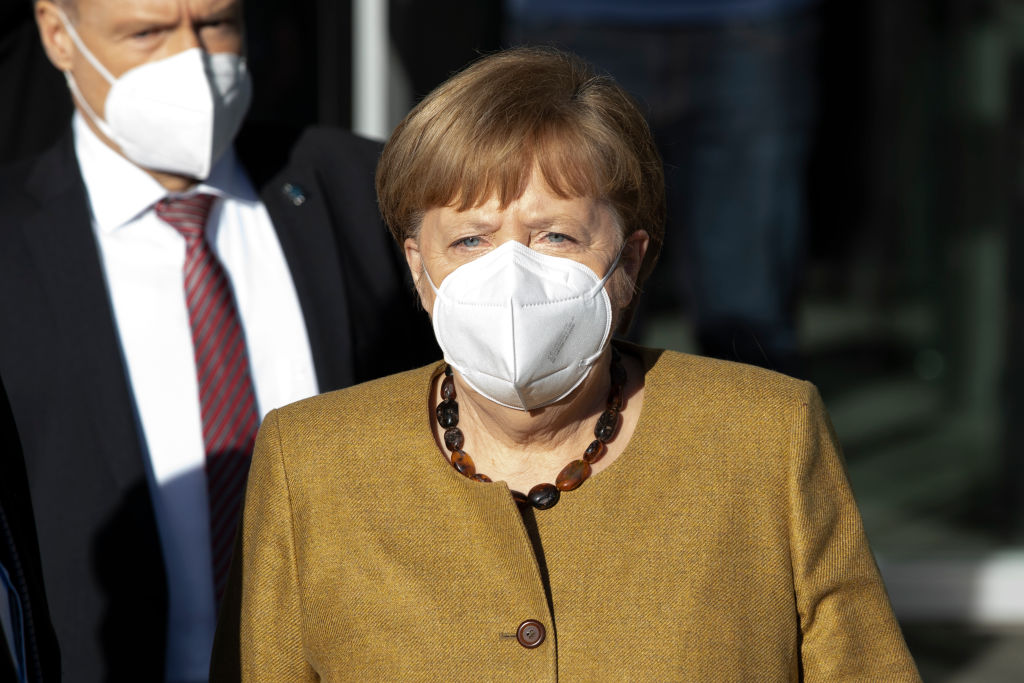Angela Merkel is known for her competency, yet even Mutti’s defenders would struggle to use that word to describe Germany’s rollout of the Covid-19 vaccine. German firm BioNTech won the race to develop a vaccine, but this has not prevented crippling supply shortages, which has forced states including North Rhine-Westphalia, in the west of the country, to suspend jabs.
German health minister Jens Spahn has come under fire and his insistence that ‘the vaccine is a scarce product worldwide’ rings hollow when Germans look at the speed of the vaccine rollout in Britain. Now, to make matters worse, German’s health ministry has found itself caught in a fresh row: over the effectiveness of the AstraZeneca Covid-19 vaccine.
German newspaper Handelsblatt reported earlier today that the German federal government only expects the jab to have an effectiveness of eight per cent among the over 65s. AstraZeneca was quick to shoot down the story, which appears to have been based on a mistaken interpretation of data on the age of participants in a vaccine trial. The German health ministry has said that it ‘cannot confirm recent reports of reduced efficacy of the AstraZeneca vaccine’.
This little episode might be seen as insignificant in the grand scheme of things, but it is the latest example of the messiness of the rollout in Germany. Everyone from politicians to the media to the vaccine producers themselves must share the blame for this disaster.
‘I don’t think it is good to discuss this matter in headlines,’ Spahn said in a television interview today, speaking about the allegations against the AstraZeneca jab. But while he might not be keen to admit it, Spahn and his health ministry are partly responsible for the mismanaged rollout.
It’s true that the federal system in Germany, which puts the 16 states in charge of building vaccine centres and administering vaccinations, makes matters more difficult for those in the federal government. But Spahn’s apparent inability to order enough vaccines in due time has also contributed to the current mess.
What makes this entire situation even more baffling in the eyes of many Germans, who, just like their fellow Europeans, desperately want to get out of lockdown, is the fact that BioNTech was the first to develop an effective vaccine. But if the jabs can’t be rolled out quickly, this success counts for little.
Back in Britain, this story has sparked fury. Tory MP Damian Collins spoke for many when, sharing a link to a report on the EU’s anger at the slow rollout of vaccines, he suggested these claims about the AstraZeneca jab might be related.
‘I wonder if this off the record briefing against the AstraZeneca vaccine in Germany has anything to do with this? Either way it is dangerous and irresponsible and only helps the anti vaccine movement,’ he said.
Whatever did motivate those who briefed Handelsblatt, it’s safe to say that Germans are deeply unhappy with how things are playing out. The slow vaccine production has led to calls for the government to step in and force BioNTech to allow Bayer, a much larger firm, to help produce the BioNTech-Pfizer vaccine.
‘Given the precarious vaccine supply, it is time that Bayer and BioNTech-Pfizer reach an agreement. If the latter refuses, health minister Jens Spahn has to step in,’ newspaper Die Zeit wrote.
Will Spahn take such drastic measures? As anger mounts, the clock is ticking for Merkel’s government to get a grip on an unfolding crisis.






Comments